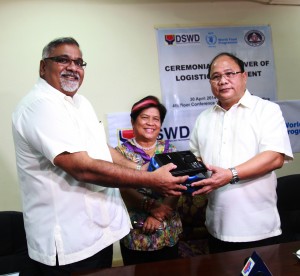
MANILA – To complement the national government’s efforts in disaster preparedness and response, the United Nations World Food Programme (WFP) today formally handed over logistics equipment to the Department of Social Welfare and Development (DSWD) and the Office of Civil Defense (OCD) at a ceremony in Manila.
The equipment, worth over PhP11.6 million (US$260,000), includes 8 mobile storage units, 1 prefabricated office and over 1,500 pallets for DSWD, and 40 satellite phones for OCD. These items were initially provided during the emergency response to the Zamboanga Crisis and Typhoon Yolanda.
“Natural disasters are one of the leading challenges to food security. WFP is continuously supporting the initiatives of the national government in disaster preparedness and response,” said WFP Philippines Representative and Country Director Praveen Agrawal at the ceremony. “It is of paramount importance to cultivate partnerships between sectors and promote resilience so that communities will be better equipped for upcoming disasters.”
DSWD Secretary Corazon Juliano-Soliman, OCD Administrator, Undersecretary Eduardo del Rosario also attended the event at the DSWD Central Office.
“WFP is one of our strategic partners,” said Secretary Soliman. “Their expertise in logistics is valuable in providing knowledge and assistance and in ensuring that the Philippines will be better prepared for future emergencies.”
“This donation will go a long way in our efforts in disaster reduction and response. We are grateful to WFP for their generous donation. The forty satellite phones will enhance connectivity for better command and control,” said Undersecretary Del Rosario. “I cannot overemphasize the importance of communications during disaster response operations. Timely response is a result of good communication.”
In the aftermath of Typhoon Yolanda, WFP, as co-lead of the Logistics Cluster, was able to transport more than 26,000 metric tons of relief items for the humanitarian community, including international agencies and non-governmental organisations, as well as the government. In addition, WFP together with DSWD was able to transport and distribute 39,000 metric tons of food assistance to people in need. Internet connectivity was also provided for over 6,000 users through the Emergency Telecommunications Cluster, which is also led by WFP.
WFP is now moving from relief to recovery and livelihood programmes in the Yolanda- devastated areas, with more than three million beneficiaries assisted through food assistance and cash transfers.
Since 2011, WFP has been working with the government to implement programmes for disaster preparedness and response and for climate change adaptation in disaster-prone areas. The aim is to increase the capacity of communities to mitigate the effects of disasters and to empower them to better prepare for future hazards.


